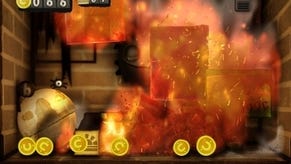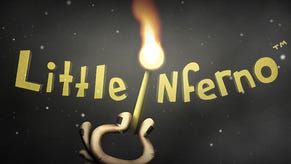Little Inferno review
Home is where the hearth is.
Darius Kazemi has solved the internet. He's completed it, at least, or maybe he's just performed a dazzling fatality. Whatever: Kazemi's built a bot that scuttles around on Amazon, logging in with its own account, and then buying him stuff at random. Inevitably, I picture one of those spidery, biomechanical things from The Matrix or Minority Report, sneaking over shimmering virtual rooftops, clettering down drain pipes made of pure information, toting little spun-silver sacks filled with loot. Look at him go! Books, CDs, improbable trousers: whenever a package turns up at Kazemi's house, he never knows what's going to be lurking inside. It's ingenious, really: ingenious and oddly troubling. This is an experiment in zombie capitalism: ceaseless consumer transactions with no room or requirement for the consumer themselves.
I can't do any of that sort of stuff, although I'll admit I see the dark, airless appeal of the project. Instead, I've got Little Inferno, the latest game from the designers of World of Goo and Henry Hatsworth. It's dark and airless in its own right. It's also comical, chilling, wonderfully clever, and - at times - shamelessly euphoric. Kazemi - and his skittering bot - would be proud.
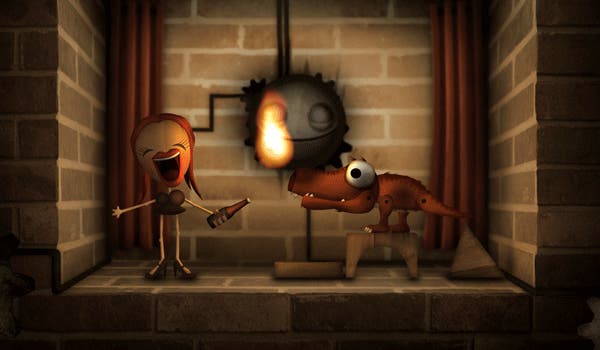
Little Inferno's a satire, preoccupied with the systems that thread themselves through consumerism and compulsion, willingly lost inside the weird muddled thrall pulling acquisition and destruction together. It's a game about games, too: it's concerned with the cynical mechanics that some designers use to keep you hooked, and yet, through its quiet craft and witty implementation, it's also about the ways in which these mechanics can be redeemed.
Oh yes, it's a game about burning stuff as well. Buying stuff and then burning it, more precisely. To this end, it has two distinct interfaces: a chirpy catalogue menu where you spend your coins on various doodads and whatnots, and a toasty brown-brick fireplace - a Little Inferno Entertainment Fireplace, no less - where you stack it all up once it's arrived and then set it ablaze. Burning the things you've bought gives you coins, which you can then spend on buying bigger, better, more expensive things to burn in the future.
It's a frighteningly satisfying loop, and one that might give you a moment's pause the next time an Amazon package drops through your front door and inside it you find that thing you'd bought in the dead of night and then forgotten about. That Brittany Murphy movie about the girl who makes Ramen. That doorstop shaped like a seal. That useless kibble your own internal randomising bot decided you should have and then nobly lugged your way.
"Like a lot of satire, Little Inferno earns its more troubling insights by giving you a truly excellent ride."
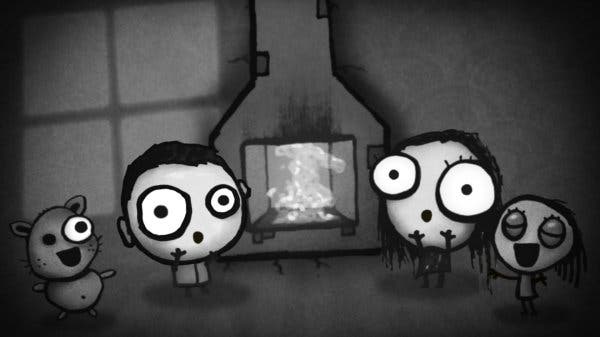
Cripes. I've gone and made it sound serious. It is serious, I think, but, like a lot of satire, it earns its more troubling insights by giving you a truly excellent ride. There's a real, if shameful, thrill to working your way through one catalogue of useless junk and unlocking the next while the oppressively cheerful 1950s sales muzak dips and dances from your speakers. There's so much humour in the items you buy, too - ageing buccaneer toys, planetary bodies that affect the fireplace's gravity, fake moustaches for making you feel more manly and spider nests for... Well, you'll see.
Each item has its own sound and its own gimmick as it burns, whether it's the corn cob exploding into a hail of buttery pops or the chainsaw rattling and spitting sparks. There are playful secrets everywhere - try laying the wooden Tetronimos down to make an unbroken row for starters - and a smart combo system encourages you to earn rewards by lighting up special items together, guiding you with a list of cryptic clues. How to get the Online Piracy combo, eh? You'll need that buccaneer, for sure, but what else?
Fire itself is handled with a click of the mouse, erupting under your pointer when you race it around the hearth and allowing you to torch things at your own pace, and with your own approach. The physics are lovely, with flames flickering and dying around the edges of brittle soot leftovers, or roaring uncontrollably when things really get cooking. Chilly stuff takes time to ignite, while papery stuff is gone in seconds. You can waste a good few minutes just writing words in the air and watching them fade, as if you were wielding a sparkler. Little Inferno's a toy as much as a game.
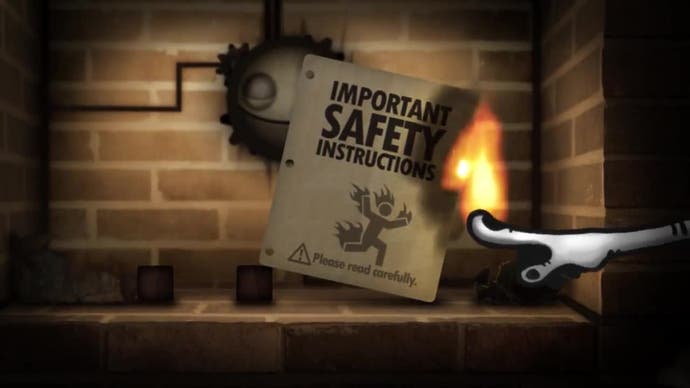
Meanwhile, you can speed up the delivery times for your latest purchases with little stamps you collect, tagging them for immediate dispatch as they appear in the tray at the bottom of the screen. You'll also receive occasional letters from a bubbly stranger and from a roaming weatherman who lives high above the rooftops. Over the course of these missives, a stark, suggestive, and wonderfully spooky narrative starts to emerge. It's told in funny little bursts in between the business of burning things - including the letters themselves, of course - and it leads to a surprisingly grandiose conclusion.
Little Inferno's a weird game, all told - not just because of the unusual objective, but because of the way it's mastered the very things that I suspect its designers hate. Its central mechanic is truly empty and truly compulsive, and yet the barest, most devastatingly mindless circuit of its interactions is redeemed by the wonderful art and the sly imagination on display. You'll burn stuff because you have to in order to advance the plot, and because it's the only outlet the designers have given you. You'll also burn stuff because it's so much fun, however: it's so richly rewarding to experiment with different fireplace load-outs, to watch as teddy bears, tiki heads, sunglasses and even house bricks go up in bright, energetic flames.
Sometimes, it's not the burning that counts, then. It's what you're burning - and how it makes you feel as you bask in the sooty glow that emanates from your hearth.



